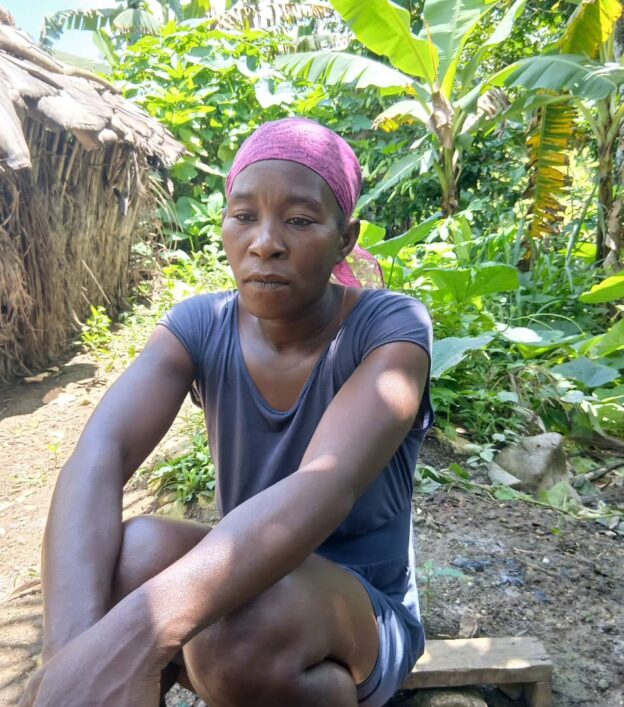Yolette lives in Motèl, a neighborhood of Gwo Moulen. She was widowed, raising her first child, and she took up with another man, Polyte. She felt she needed help to take care of her girl. She and Polyte have since had five more children.
But as they lived together, she had to face his mistreatment of her and of her oldest daughter. At first, he would give Yolette money to buy the clothes the girl needed. But that eventually stopped, and as her girl became a young woman, she took up with a man when she was still too young, and soon she had a child of her own. When the man abandoned her and her child, Yolette was left with the burden. She struggles to provide what her grandchild needs.
She did it all with her own farming. When Polyte gave her something out of his harvest to sell at market, he insisted that she bring him all the proceeds. And that was at the heart of her problems. If she tried to argue, he would yell, he would swear, he would even hit her.
Despite it all, she managed to acquire two goats and some chickens. She bought them with the little money she could secretly save out of the food money Polyte provided. To keep him from getting mad or from taking the animals away, she lied. She told him that they did not belong to her, that she was taking care of them for someone else.
When she joined the CLM program, she began saving her weekly stipend and investing it. She bought ducks and a turkey. She received 23,000 gourds as funds for business capital, and together with her case manager, Makenson, she planned her purchases. She bought two goats and a pig, and she used the balance to invest in a business selling cooking charcoal. She used her income from the charcoal to feed her family. By this time, Polyte had stopped providing any help at all. He wouldn’t even help her look after her livestock.
One day, Yolette was sitting with Makenson, talking about her troubles with Polyte. Makenson started looking for chances to talk with him. Polyte seemed to want to avoid him, staying away from home whenever Makenson was scheduled for a visit. So, Makenson made efforts to cross paths with the man when he was out and about in the neighborhood. Their short conversations began to help. Polyte started to change.
She was scheduled to receive 20,000 gourds to repair her home, like all the CLM members in her cohort, but she and her family were living in a small house on Polyte’s family’s land, and it did not really need serious repair. So, she discussed it with Makenson, and she made another plan.
She had money in a sòl, a sort of savings club common in Haiti. Members make a fixed regular contribution and take turns receiving the whole pot. When it was her turn to receive the money, Yolette added the home repair money, and she bought a horse. Buying a pack animal really set her business in motion. With the money she earned, she soon bought another pig and another goat. She also paid school fees for three of her children and bought shares in her VSLA every week.
When she was scheduled for refresher training, Makenson made sure personally to invite Polyte to an accompanying session for men on positive masculinities. Polyte decided to attend, and since then the improvements in his behavior have just continued. He now helps Yolette consistently with management of her livestock. He has stopped his yelling and his violence, both towards Yolette and towards her oldest daughter.
In July, her VSLA’s one-year cycle closed, and she collected 26,000 gourds in savings plus the interest she earned on it. It wasn’t enough to buy a cow, which was her next objective, but by then she had twelve goats, so she sold three. That gave her the full amount, 45,000 gourds, that she needed to buy a heifer. And she still has nine goats, two pigs, her horse, 15 chickens, and a turkey.
Now she says she lives well, even if Polyte still isn’t everything she hopes he will be. Her current plan is to buy land. Someone in a neighboring area has offered her a plot for 60,000 gourds, and she is saving in her VSLA and through a sòlso she’ll be able to do it. She’s come to see that she never lacked the will to work for progress, she just needed for someone to give her a hand.
